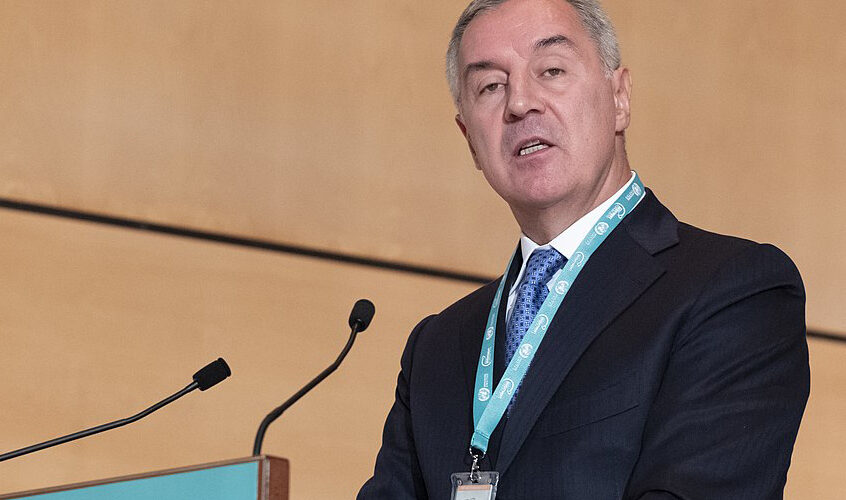There is a European country whose leader has been in power since 1990, four years longer than Belarus’ strongman Alexander Lukashenko. This weekend, the game for Montenegro’s President Milo Djukanovic will finally be over.
April 2 will almost certainly become a historic day for the tiny Balkan nation. In the second round of the presidential elections, Jakov Milatovic, deputy-leader of the Europe Now party, is expected to defeat Djukanovic who has been ruling the country, be it as a president or a prime minister, for 33 years. That, however, does not mean that a post-Djukanovic Montenegro will change its pro-Western geopolitical course.
In 2017, the former Yugoslav republic joined NATO, even though the United States-dominated alliance bombed Montenegro and Serbia in 1999 during the Kosovo war. Moreover, Podgorica recognized Kosovo’s unilaterally declared independence from Serbia in 2008, which had a significant impact on Montenegro’s relations with Belgrade. Although Milatovic’s victory might, at least to a certain extent, lead to improvements of political ties between Podgorica and Belgrade, a new Montenegro’s leader will not withdraw Djukanovic’s decision on recognition of Kosovo, since such a move would not be welcomed in the West.
In the past, Djukanovic was accused of discriminating the Serbs, who make up some 30 percent of Montenegro’s population. Even though most Serbs will vote for Milatovic on April 2, their status in a post-Djukanovic Montenegro is unlikely to be improved. The very fact that dozens of children in Podgorica, on March 26 ahead of Euro 2024 qualifier, welcomed the Serbian national football team – which drew criticism among Montenegrin nationalists – clearly shows that Montenegro’s society remains deeply divided over ethnic and religious matters.
Although new authorities may attempt to reduce ethno-religious tensions, Milatovic, as a pro-Western politician, is unlikely to pursue pro-Serbian policy.
However, unlike Djukanovic, who resolutely opposed the very idea of Montenegro’s participation in the Open Balkan Initiative – whose members are Serbia, Albania, and North Macedonia – Milatovic appears to have a more pragmatic attitude regarding the regional integration processes. As a result, Montenegro is expected to host the next Open Balkan Summit in June, which could be interpreted as the first step in the nation’s membership in the Open Balkan Initiative.
That, however, does not mean that Podgorica will give up on its EU aspirations. Montenegro, as well as other regional actors, will remain on the “European path”, hoping to eventually join the European Union, although it remains highly uncertain if Brussels, under the current geopolitical circumstances, is interested in the bloc’s enlargement. But on April 2 the EU will undoubtedly welcome what appears to be Milatovic’s inevitable victory, which will be a clear signal that Montenegro, even without Djukanovic in power, will remain in the Western geopolitical orbit.
Milo Djukanovic, as an experienced politician, is quite aware that his time is over. In 2020, following a wave of protests against the controversial Law on Freedom of Religion, it became obvious that the West does not count on him anymore. As a result of the 2020 parliamentary election, his nationalist Democratic Party of Socialist (DPS), despite winning most seats, did not manage to form a new government. That was the beginning of Djukanovic’s downfall.
After he suffers a final defeat on Sunday, his party is expected to face a schism. On June 11, the country will hold an early parliamentary election, and the DPS, for the first time in three decades, will almost certainly no longer be the strongest party in Montenegro’s parliament. That will be the end of Milo Djukanovic’s era.
At this point, it remains highly doubtful if the new authorities will get the green light from the West to prosecute Djukanovic over his alleged ties with the organized crime. In the past, Montenegrin leader was accused by the Italian prosecutor of “having promoted, run, set up, and participated in a mafia-type association”, as well as being involved in in tobacco smuggling. But given that he has been decisively pursuing pro-Western policy for decades, the United States and the European Union, as the major foreign powers operating in the Balkans, decided to turned a blind eye to his actions at home. Will they now take concrete legal steps against Europe’s longest-serving autocrat, or will he be allowed to spend the rest of his life as a political pensioner whose only job in his entire career was to rule the country?
One thing is for sure: the upcoming presidential and parliamentary elections will result in a change of Montenegro’s leader, but the country’s foreign policy, especially its relations with NATO and the EU, will remain intact.
Image: UNCTAD

